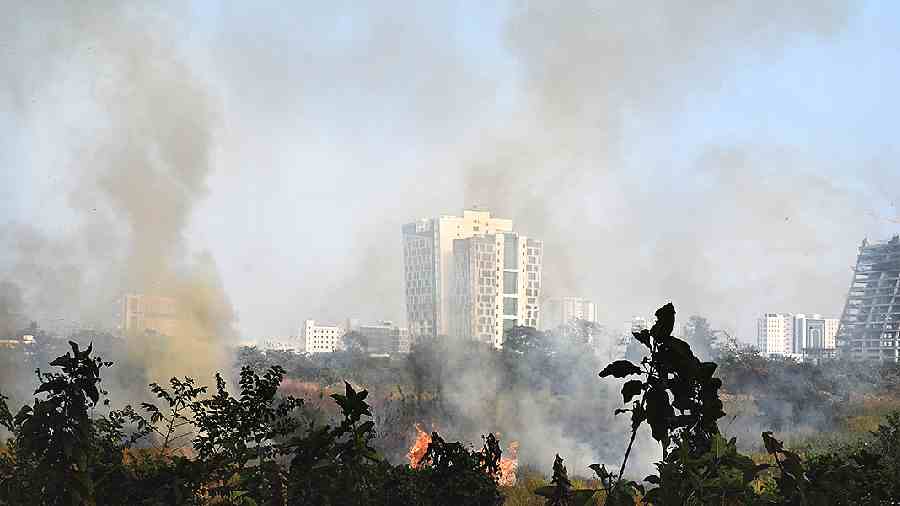Burning of waste in the open is banned. However, smoke from roadside eateries and waste set on fire on empty plots and pavements are hard to miss in the city.
A study conducted by the National Environmental Engineering Research Institute (NEERI) to identify the various sources of air pollution has pointed out that coal and wood combustion are the major reasons why Kolkata’s air quality is so poor.
The study, published in 2019, claimed that coal combustion contributed 22 per cent of the PM 2.5 content in the city’s air during winter, wood combustion contributed 11 per cent, agricultural waste burning contributed 2 per cent and open burning of waste contributed 4 per cent.
PM 2.5 are fine particles that can enter the deepest crevices of the lungs. They also have the ability to penetrate into the blood stream and from there can travel to any organ, said an environmental scientist.
Many of the roadside eateries use wood and coal to fire their ovens.
The Telegraph spotted dense black smoke rising out of wood and coal-fired ovens along Rashbehari Avenue and in Esplanade, Sector V and New Town.
A senior official of the West Bengal Pollution Control Board and a section of city-based environmentalists said most roadside eateries with coal-fired ovens use low-quality peat coal that generates a lot of smoke and pollutants during combustion.
Apart from that, many shops use wood and even bamboo shafts to light fires. These, too, generate a lot of smoke.
In New Town, the problem is more pronounced as waste, dry leaves and broken branches are set on fire regularly in all three action areas, forcing residents to keep their doors and windows shut as dense smoke engulf blocks.
This is in addition to the smoke generated from ovens at food stalls that have mushroomed across New Town. Some of them are behind Nazrul Tirtha, near Ecospace and in front of Sukhobrishti housing complex.
Last month, residents of the township had complained to the New Town Kolkata Development Authority (NKDA) multiple times about waste burning in the open.
Such is the extent of the problem that NKDA has kept dedicated water bowsers, which are sent regularly following alerts by residents or officials to put out fires.
Environment activist Subhas Datta said smoke from roadside ovens as well as burning of waste in the open led to a “steep spike” in air pollution levels. “These generate large amounts of pollutants such as carbon monoxide and sulphur, which have far-reaching effects. Strict measures to curb such activities must be taken,” said Datta.
Debanjana Das, an atmospheric scientist with HowardUniversity in Washington DC, said burning of grasslands had far-reaching effects.
“When waste is burned in the open, tiny toxic particles such as PM2.5 and PM10 and toxic gases like oxides of nitrogen and carbon monoxide are released in the air. PM2.5 can enter crevices deep inside the lungs and trigger respiratory problems,” said Das.
An NKDA official said burning waste in the open was banned in New Town. Anyone caught doing so is liable to be fined Rs 5,000.
The Kolkata Municipal Corporation can impose a fine varying between Rs 5,000 and Rs 25,000 on anyone caught burning waste in the open.
